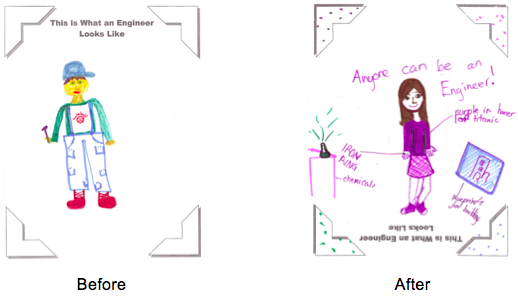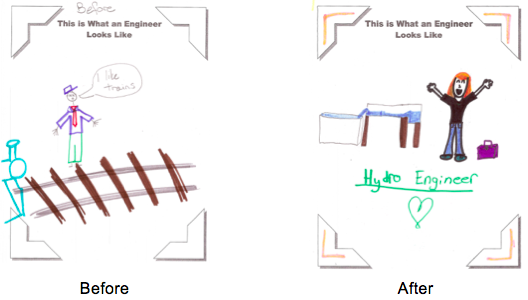One of the many reasons women are under-represented in “tech-sector” engineering disciplines such as software, mechanical, electrical, computer and mechatronics engineering is because we’ve done a terrible job conveying how engineers contribute to society in meaningful ways.
Many women, as studies have shown, prefer to enter professions where they can have a beneficial impact on people and society. This preference affects the STEM (science, technology, engineering and math) fields in many ways, and partially explains why engineering disciplines, which have obvious societal benefit such as biomedical engineering and environmental engineering, also have the highest female participation rates (40 percent). The tech-sector engineering disciplines, conversely, struggle to sustain a meager 15 percent female participation.
Along with many others in my profession, I believe a primary reason tech-sector engineering disciplines aren’t on young women’s list of possible professions is because the current narrative regarding engineering is anything but inclusive — and rarely shows how our profession positively impacts society.
Our children and youth have not been getting the right message about the societal value of engineering and, because they represent the very beginning of the engineering talent pipeline, without a better understanding at a young age of what engineers “do” for society, they are unlikely to make the educational or personal choices that lead to an engineering career path.
New narratives needed
I see this disconnect about engineers’ societal value on a regular basis. My team and I at the University of Waterloo in Canada run one of North America’s largest engineering outreach programs. We conduct programs for local elementary and high schools, so we see firsthand what our youth think of engineering.
Ask girls in grade 4-6 what an engineer does and there is a good chance she will draw you a man in overalls and a cap, driving a train. Yet ask her what a doctor or teacher does for a living, and she will draw capable women with stethoscopes helping patients or reading to children. However, after they spend even a few hours with Waterloo engineering students, these girls develop a new perception of engineers based on this new narrative, as the pictures below illustrate.


“This is What an Engineer Looks Like” drawings by girls in grades 4-6.
This lack of good engineering narrative has been going on for a long time. Our surveys show that most women entering university for an engineering education do so not because they heard good things about engineering in their daily lives, but rather, they choose engineering because a person they trusted (teacher, guidance counsellor or relative) suggested it. For those without trusted persons offering this type of guidance, the present tech-sector engineering narrative is turning away many bright and talented young women.
The fingerprints of engineers are embedded in everything we use, even if we can’t see them.
Narratives are important. They frame our understanding of our world, our possibilities and ourselves. Narratives can have a powerful influence over people and their impression of a culture both within the group and outside it. Harmful narratives lead to stereotyping and prejudice. Engaging, meaningful narratives lead to clarity and understanding.
Unfortunately, in the engineering profession, especially the tech world, a powerful and divisive narrative is already in place that continues to shape our history, the people that enter our profession and our culture. And it’s hurting us.
Some examples of our existing negative narrative include:
- Engineers don’t have social skills
- Engineers are geeks
- Engineers are men
- Engineers are not good communicators
- Engineers have no people skills
- Engineers are not creative
- Engineers have no fashion sense
- Engineers are introverted
- Engineers are smart
- Engineers can fix almost anything
- Engineers are good at math
People’s beliefs based on the current engineering narrative determine their attitudes, behaviors, and choices, even if these perceptions are completely disconnected from reality. Ultimately, these narratives shape the choices people make by communicating to them where they belong.
Look around you. In most parts of the developed world, the makers of technology are disconnected from the result. Our children play with their iPads, our grandparents post on Facebook, our mothers Instagram their yoga class and coding, thankfully, is now in the elementary school curriculum.
Yet the software program that is helping your aunt monitor her diabetes, or the mechatronics technology that is improving prosthetics for amputee veterans or the data scientists unraveling the wisdom buried in big data so energy and water use can be decreased is rarely positioned as the work of engineers.
This leads to a situation where, in developed countries, clean water, computers and complex transportation and infrastructure systems are taken for granted — yet the people who designed and created them are absent. As I tell my engineering students, the fingerprints of engineers are embedded in everything we use, even if we can’t see them.
Technical ambassadors
Over the last 50 years, the role of engineers in society has evolved. No longer is an engineer just the technical specialist who does only complex calculations. Despite media portrayal of engineers as “geeks,” (something we are proud of) we need to acknowledge the engineering profession is integral in the improvement of the human condition. In many cases, engineers are now the technical ambassadors that bridge the divide between technology and society. Our work has purpose and engineering is a meaningful career.
Engineers are contributing to shaping our future, so I challenge all engineers to tell the stories of why engineers matter to the world and of the good work they do. Let’s change our narrative together so we can attract more good people to our profession.
